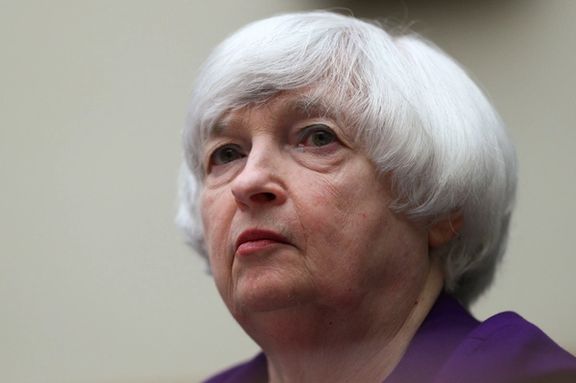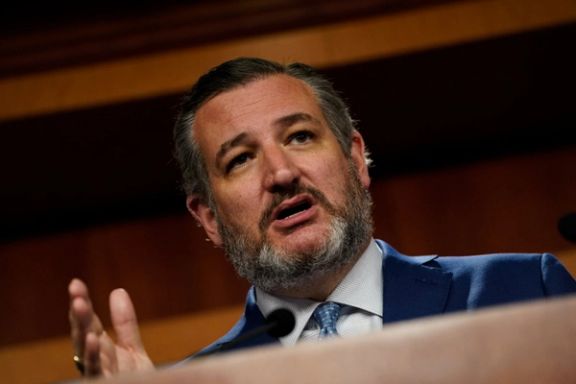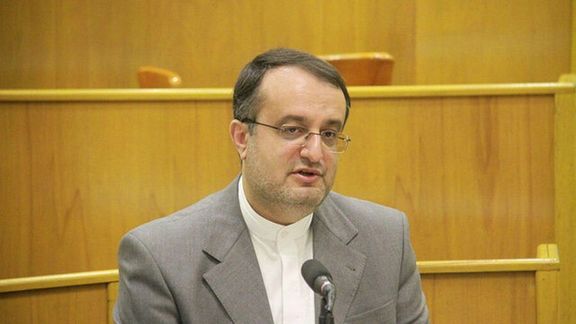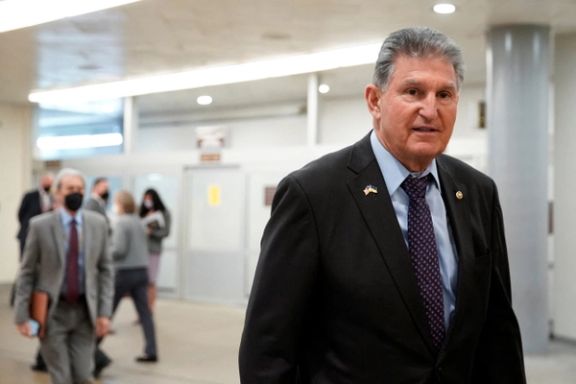State Department Says Biden Considers Qods Force A Terror Group

The US State Department said Friday that President Joe Biden regards Iran’s Revolutionary Guard’s extraterritorial Qods (Quds) Force a terrorist group.

The US State Department said Friday that President Joe Biden regards Iran’s Revolutionary Guard’s extraterritorial Qods (Quds) Force a terrorist group.
On Thursday, Chairman of the Joint Chiefs of Staff Gen. Mike Milley told a Congressional hearing that he opposes removing the Islamic Revolutionary Guard Corps (IRGC) from the US terror list and believes the Qods Force to be a terrorist organization.
“I’d say that the President shares the chairman’s [Gen. Milley] view that IRGC-Quds Forces are terrorists, and beyond that, we aren’t going to comment on… topics in the nuclear talks,” Deputy State Department Spokesperson Jalina Porter said.
Negotiations that started one year ago in Vienna to revive the 2015 nuclear deal known as JCPOA are in a state of limbo after Iran demanded the removal of IRGC from the US Foreign Terrorist Organization blacklist. The Biden Administration has apparently not made a decision on Iran’s demand.
Most Republicans and many Democratic lawmakers have increasingly voiced opposition to delisting the IRGC, which has created a network of militant proxy groups in the Middle East and threatens US allies.
The nuance in the State Department statement is about whether President Biden considers the whole of IRGC a terrorist organization or is trying to only keep the Qods Force on the terror list and remove the larger organization to reach a deal with Tehran.

The top US general says he does not support removing Iran's Quds (Qods) Force, an arm of its Revolutionary Guards (IRGC), from a US terrorism list.
Chairman of the Joint Chiefs of Staff General Mark Milley told the Senate Armed Services Committee on Thursday, "In my personal opinion I believe the IRGC Quds Force to be a terrorist organization and I do not support them being delisted from the Foreign Terrorist Organizations (FTO) list."
Milley’s remarks were worded very carefully as he differentiated the IRGC from the Quds Force -- its extraterritorial military wing – suggesting that the Biden administration may considering delisting the IRGC as an FTO but keeping its Quds Force as a terrorist organization.
Such a move may be intended to resolve one of the remaining issues in talks to restore the 2015 nuclear deal known as the JCPOA that have reached a deadlock over Iran’s demand to delist the IRGC.
The Trump administration added the IRGC to the list in 2019. Iran insists that delisting the IRGC is a requirement and 'red line' for a deal, and its foreign ministry blames Washington for the delay in reaching a deal, saying the halt in the Vienna talks is due to US failure to make a "political decision".
The Biden administration has apparently not made a decision yet, amid rising opposition by Republican congressmen as well as a growing

The US Treasury says Washington will not allow Iran to access in dollars its reserve assets maintained by the International Monetary Fund (IMF).
Treasury Secretary Janet Yellen said Wednesday that Iran would not be able to receive in US dollars its special drawing rights (SDRs), a supplementary asset allocated by the IMF as a potential claim on the “freely usable currencies of member states.” The system is used by the fund to assist member states in the interests of the global economy, with the largest ever allocation approved in August 2021 to help countries cope with the Covid-19 pandemic.
Iran has been short of foreign reserves, especially dollars, since the US in 2018 imposed ‘maximum pressure’ sanctions threatening third parties buying Iranian oil or dealing with Tehran’s financial sector. Talks in Vienna between Iran and world powers have been taking place for a year to revive the 2015 Iran nuclear deal, which eased sanction in return for curbs on Iran’s atomic program.
Yellen’s remarks came in response to Louisiana senator John Neely Kennedy − an opponent of the 2015 Iran nuclear deal − who said Wednesday he wanted to know why the US administration was ‘supporting’ the IMF in allocating SDRs to Russia, Iran, and China.
The senator told the Washington Examiner that not enough attention was paid to what he claimed was the US backing the allocation of $650 billion in SDRs in 2021. Kennedy appeared to be referring to the total amount of SDRs allocated last year – by the IMF, not the US administration − expressed as a dollar equivalent.
‘Gift to Iran’
The Washington Examiner claimed Iran had in 2021 received $4.5 billion in SDRs, Russia $17 billion, and China $40 billion. “We ought to hold hearings and ask why” the US had approved this, Kennedy said. “There is some reason they wanted to do this, this is a gift to Iran, it’s a gift to China.”
Abdolnaser Hemmati, then governor of the Central Bank of Iran, said April 19, 2020, that Iran had asked to receive its SDRs as allocated by the IMF, which he valued at 3.6 billion in terms of US dollars.
SDRs are set in terms of a basket based on the US dollar, the Chinese renminbi, the euro, the Japanese yen and the British pound. A recent IMF paper highlighted the long-term decline of the dollar in international reserves, losing ground both to the Chinese renminbi and smaller currencies, and there has been growing criticism of the US ‘politicizing’ the dollar as an international currency. Despite US and western European sanctions, Russian international reserves increased $2.1 billion over the week ending April 1, reaching the equivalent of $606.5 bn, according to the Bank of Russia. Europe continued to buy oil and gas from Russia, but most of the reserves are frozen by Western sanctions.

Senator Ted Cruz has criticized the Biden administration for ‘deliberately’ keeping Congress in the dark over the details of a potential nuclear deal with Iran.
In a brief interview with Iran International’s correspondent Arash Alaei on Thursday, the Texas Republican Senator said the reason the administration doesn’t want everybody to know about the details “unfortunately is the deal they’re negotiating [which] is a terrible deal for America”.
“Joe Biden has asked [Russian President] Vladimir Putin to negotiate on our behalf, and Russia is negotiating with Iran right now in Vienna. Russia is our enemy and Iran is our enemy”, he added, noting that “the one thing they can agree on is policies that endanger the safety and security of America”.
“This deal is a catastrophic mistake and that’s why the Biden administration is so desperate to hide the details of it from the elected members of the Congress”, Cruz said.
Former president Donald Trump withdrew from the 2015 nuclear agreement with Iran known as JCPOA in 2018, saying it was in adequate to keep Tehran from building nuclear weapons. He imposed ‘maximum pressure’ sanctions. President Joe Biden announced before the 2020 presidential elections that Trump’s policy was wrong, and he would work to revive the JCPOA.
Republicans have opposed Biden’s approach from the beginning and their objections became more intense as reports emerged that the White House was weighing the removal of Iran’s Revolutionary Guard from the US list of Foreign Terrorist Organizations (FTO). More Democrats have lately joined the opposition as talks in Vienna to revive the JCPOA have stalled.
About the administration’s options in case of the collapse of the deal, he said, “What they should do is return to the policy of [Donald Trump’s] maximum pressure; they should impose sanctions, they should enforce sanctions”.
Slamming Biden for easing on the oil sanctions that has seen Iran increase its oil exports and revenues, he said, “Right now the Biden administration is turning a blind eye while Iran openly flouts the oil sanctions. The Biden administration is allowing the Ayatollah to sell a million barrels of oil a day with no consequences”.
“The Biden administration has delisted [Iran-backed] Houthis as terrorists even as they carry out ongoing terror attacks”, Cruz said, adding that “the answer is to reverse course entirely; end their policies of weakness, appeasement, and surrender, and instead follow a policy of maximum pressure to prevent the ayatollah from developing nuclear weapons and carrying out terror attacks against Americans and our allies”.

Tehran said Wednesday that before the 2015 nuclear deal is revived it will not give the IAEA access to data from cameras at a new centrifuge parts plant in Esfahan.
Mohammad Reza Ghaebi, Head of Iran's Permanent Mission to International Organizations in Vienna and acting ambassador to the International Atomic Energy Agency (IAEA) told reporters in Vienna that Iran would not provide access to the cameras installed by the agency in Esfahan if the 2015 nuclear deal, Joint Comprehensive Plan of Action (JCPOA) is not restored.
“That is why the agency has announced that it was unable to confirm whether or not the manufacturing of spare parts for centrifuges has begun in Esfahan,” Ghaebi noted.
The Esfahan site was built to replace the TESA Karaj Complex, a now decommissioned workshop in the west of the capital Tehran. The Karaj site was damaged in a June 2021 attack that Iran said Israel was responsible for. The IAEA has confirmed that the production of centrifuge rotor tubes and bellows at TESA Karaj Complex has stopped.
Ghaebi added that on April 4 Iran informed the IAEA that all the machines for production had been transferred from Karaj to Natanz and on the same day allowed the agency's inspectors verify the move and that the machines were not operating.
IAEA inspectors installed surveillance cameras at the Esfahan facility January 24 to ensure the machines intended for the production of centrifuge rotor tubes and bellows were under monitoring but the production of the parts there had not started.
Reuters reported on Wednesday that in a new confidential report to its member states, the IAEA has said that Iran moved all its machines making centrifuge parts from the workshop at Karaj to its Natanz site. The equipment, according to the report, remained under IAEA seal at Natanz and was not operational.
The report also said that Iran set up another site at Esfahan where the IAEA has also installed cameras but Iran has not given access to the data and recordings from these cameras.
“Without access to the data and recordings collected by these cameras, the agency is unable to confirm whether the production of centrifuge components at the workshop in Esfahan has begun,” the report to IAEA member states said according to Reuters.
In December 2020 the Iranian Parliament passed a law to mandate the Atomic Energy Organization of Iran (AEOI) mandating the government, if US sanctions against Iran were not lifted, to start 20 percent enrichment, install 1,000 advanced centrifuges, and produce at least 120 kg of highly enriched uranium (which is at least 20 percent) within two months of the bill’s approval.
The legislation also required reduction of IAEA monitoring to the to the level required by the Nuclear Non-Proliferation treaty (NPT). The agency had exercised greater access both under the JCPOA and Iran’s Additional Protocol to the NPT.
Under temporary agreements with the IAEA, Iran continues to keep footage from the agency's cameras instead of destroying them, as it had said it would, but does not provide them to the IAEA.

Opposition against a nuclear deal with Iran is growing among US lawmakers with Democratic Senator Joe Manchin saying he is “very leery” of the ongoing talks.
“I wasn’t for it before and I can’t see myself changing my position”, Manchin of West Virginia told Jewish Insider on Wednesday.
He was one of four Democratic senators — along with Bob Menendez (New Jersey), Ben Cardin (Maryland) and Senate Majority Leader Chuck Schumer (New York) — who voted against the original nuclear agreement between Tehran and world powers in 2015.
Also on Wednesday, New York Democratic Representative Thomas Suozzi expressed concerns “that any wrong move may wrongfully empower Iran, put Israel and the region at risk, and further heighten international tensions”.
Calling Iran “a bad actor” that “cannot be trusted”, Suozzi noted that “If any negotiations continue to move forward, we must ensure that Iran is blocked from purveying its malfeasance throughout the region and the world”.
Earlier in the day in Washington, a group of House Democrats held a news conference marking the first anniversary of the start of the Vienna talks to express concern over the US administration’s efforts to reach a new deal with Tehran.
Almost all Senate Republicans and many in the House have criticized the Biden administration for its pursuit of a new accord, and Democrats have recently joined the opposition.